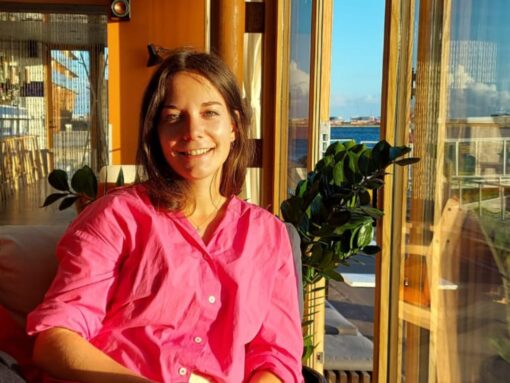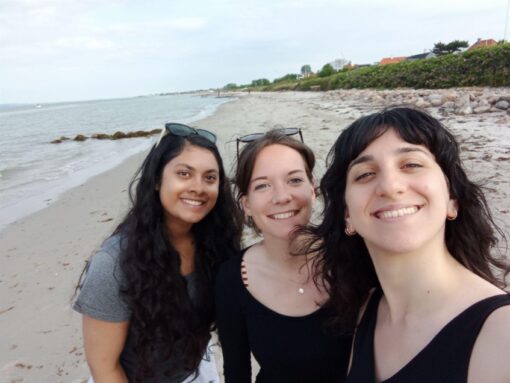Doing research on complex urban issues is not an easy task as it requires skills and knowledge on how to navigate and work within a transdisciplinary setting. Accordingly, the Erasmus Mundus joint Masters in Urban Studies (in short: 4CITIES) team at the University of Vienna organised and hosted a week-long Spring School on methods and skills for urban research(ers) for its 39 international and interdisciplinary master’s students. The spring school took place for the first time from April 8 to 13, 2022 at the University of Vienna, and utilized the Circular City as an overarching theme, which framed assignments, discussions and reflections. Moreover, the Spring School included intriguing, in-depth urban methods trainings with guest lecturers from various European research institutions, exchanges with urban practitioners from different sectors throughout Vienna, and helped inspire creative ideas to address the challenges of building a more Circular Vienna.
Why the Circular City?
The Circular City is an emerging concept of urban sustainability that is being pursued by an increasing number of European cities and which essentially strives to ‘close’ resource loops in cities through reduce, share, reuse, remanufacture and recycle strategies. For instance, Vienna is one of these cities as its efforts towards becoming more circular, and dedication to closing loops continues to increase each year. However, the nature of this concept is complex and contested due to the diversity of urban sectors and actors affected by the circular city concept. Subsequently, this context makes it a relevant, and important matter for teaching and learning transdisciplinary research methodologies.


Why a Spring School on urban methods and skills for master students in urban studies?
4CITIES is an international and interdisciplinary joint master programme in urban studies with semesters at six universities in Brussels, Vienna, Copenhagen and Madrid. Funded by the prestigious Erasmus Mundus programme, 4CITIES’ perspective is European while its context is global. More specifically, 4Cities bridges disciplinary limitations by combining sociology, geography, history, cultural studies, and humanistic urban studies to provide students with an array of means and methods for analysing and understanding the specific character of cities. Similarly, the programs student profiles are very diverse, as the current Cohort 13 includes participants from roughly 25 countries and 25 disciplines.
In order to develop a solid foundation among this diverse group in terms of methods and skills for urban research, the spring school was dedicated to methods from different inter- and transdisciplinary urban research perspectives. The Spring School took place at the beginning of the second semester of the two-year master’s programme, when students just started to develop their master’s thesis topics. In this vein, the aim was to help students reflect on and develop their methodology and research question for their thesis by introducing them to and applying a selection of additional urban research methods.

Main activities of the 4CITIES Spring School
The Spring School programme focused on two main elements: 1) learning new methods and applying them to urban research topics with international guest lecturers and 2) learning and testing methods and skills for transdisciplinary urban research through exchanges with local and international guest lecturers and urban actors from the City of Vienna on the overarching Spring School theme – the Circular City.
The first element consisted of three intensive methods courses on
- Visual methods and ethnographic research, led by Andrew Harris and Nathaniel Telemaque from the University College London Urban Laboratory,
- Participatory GIS, led by Anna Kajosaari from Aalto University, Department of Built Environment, and
- Quantitative methods, led by Helen Cole from the Barcelona Lab for Urban Environmental Justice and Sustainability.
The second element on transdisciplinary skills focused on methods and skills needed for co-creating knowledge between urban practitioners and scientific actors to address complex, uncertain, and contested urban sustainability issues, such as the Circular City. It incorporated a course on ‘futuring’ for urban sustainability by Maarten Hajer and Jeroen Oomen from the Urban Futures Studio at Utrecht University. In the transdisciplinary part, 4CITIES students co-designed challenges and co-developed and discussed potential solutions to a circular built environment in Vienna with invited urban actors, including representatives from the municipal department on urban development and planning (MA 18), the Viennese circularity pioneers “Materialnomaden” and “BauKarussell”, the Technical University of Vienna, the initiative “Circular Wien”, and Urban Innovation Vienna.

The programme was complemented with a field trip to the “Zukunftshof” (“Future Farm”) in Favoriten, Vienna. Here, the students gained insights into an emerging lighthouse project for urban agriculture based on principles of the circular economy. Embedded in the excursion to Zukunftshof, Anahi Montalvo Rojo and Mark Scherner from the University of Vienna offered a workshop on photography as a research method, in which the students explored their way from the centre of Favoriten to the city border photographically and discussed their observations and perceptions with the group.
Reflection and lessons
The 4CITIES Spring School was an exciting yet demanding learning experience for the students and lecturers as well as the organising team. With regards to collaboration, working continuously as a team for five full days brought the group of students, teachers, external guests and organisers together and fostered creativity and the development of impressive ideas by the students for the Circular City Vienna in a very short time. In terms of practical experience, the Stakeholder Event on the fourth day proved to be a key highlight as it allowed students to intensively interact with a wide-range of urban actors in Vienna. Lastly, in relation to novel pedagogical approaches, the structure of the spring school and the diverse entry points into urban research methods allowed students to methodically approach various urban topics, especially the Circular City, and reflect on what they had learned in the context of their own master’s thesis topic.

However, for the transdisciplinary element to come to full fruition, more time and space was needed to more intensively convey and mediate the particular challenges of transdisciplinary collaboration. Consequently, this will be followed up during the ongoing semester and advanced in the future to further promote learning, reflection and the testing of methods and skills for continuous and reflective collaboration with urban actors.
Based on the learnings of this first Spring School we aim at following up on this inspiring opportunity for intensive methods lessons for the students, for making contacts with urban society, and for promoting collaborative teaching with urban studies research groups in the future.
The Spring School team would like to sincerely thank all the 4CITIES students, lecturers, urban practitioners, organisers and colleagues at the department for their support and contributions to this fantastic week!





Really enjoyed reading this! It’s refreshing to see such an honest take on what an exchange semester is actually like — not just the travel highlights, but also the cultural shocks and the little things that take time to get used to.